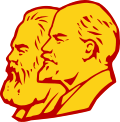Strategically important sectors of the economy
In Marxist-Leninist theory, the commanding heights of the economy are certain strategically important economic sectors. Some examples of industries considered to be part of the commanding heights include public utilities, natural resources, and sectors relating to both foreign trade and domestic trade.
